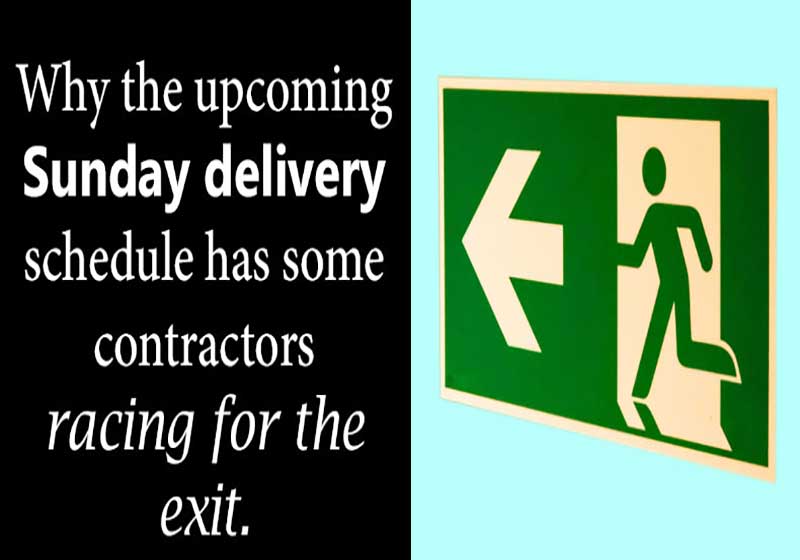Upcoming changes at FedEx spell both opportunity and turmoil.
Throughout the last 10 years of digging into FedEx routes, I’ve predicted many changes and watched the fallout from those events. What’s notable as of late is the speed of which the changes are occurring in 2019 vs back in 2009.

Back when I first started helping people learn the intricacies of routes, it was a mostly very easy game to play of just trying to figure out what the income was estimated to be. Once you knew that, you could pretty much expect that number to steadily increase throughout the years of growth in eCommerce and FedEx’s market share in a lot of the last mile delivery business.
If you knew had knowledge of how much it costs to rent a FedEx scanner, or how much it cost to put the logos on the side of the trucks, and so on, the financial side of the evaluation was quite easy back then.
ROUTE INCOME:
These days, it’s not adequate whatsoever to simply know what the income is on one of these businesses. When you know why a route engineer decides to pay certain amounts for certain activities (eg. Surge Stop Threshold, Service Charges, etc), then you can start to make some headway. Stack it up with a huge compilation of actual expense statistics for contractors, and you can really start to get some decent net income estimations.
The problem is what a route is cash flowing today just doesn’t matter nearly as much.
Most people that look at routes want to know the income and valuation of a route.
Since all FedEx routes have a manager and that means it’s easy, riskless, stress free, and absentee, right?! Wrong.
Regardless, determining the valuation and net income are 2 very easy things to ascertain reasonably well fairly quickly. It’s what a lot of people ask about and I can answer those fairly easy with my experience.
The real question people are asking though is, “Should I buy this business or not,” which is what I actually have to answer.
I believe that if people evaluated a route bundle similar in the way they considered a job, they’d probably be much better off. When you think of a job, you think about what it’s going to take to be successful, whether you have the skills to do a job, whether you have the time to do it, whether you want to do the job’s description, and finally you consider your risk of being downsized, terminated, and so on. Knowing to look for these things, as well as the exact process to figure that out, takes some real time and knowledge of FedEx routes.
So, when you hear of a new mandate or contract requirement that comes from FedEx, you should really be considering all of these things. This allows for you to find a fantastic business that’s pleasant to operate, has a realistic income projection, and finally know how likely it is for the net income to continue on at their current levels (and no, it’s NOT always correlated with package volume).

Thinking about a business using the following 3 pillars of due diligence will help you tremendously so that you can clearly consider 3 main questions:
- What’s my net income?
- What’s the amount of time / effort it’s going to take to generate that net income?
- What’s the chance that income changes in the near future?
My clients all know the trifecta of establishing the Net Income, Ease of Management, and Sustainability deeply well and know precisely how to assess each of those points to dodge awful routes and lock in on the best routes to get moving forward fast.
All of this is to say, when you see these changes such as contract duration changes, Sunday delivery, SmartPost changes, etc, you should beware of sellers that want to twist these changes into something that’s purely good.
There are massive pros and cons to each of them.
Some of them will create big opportunity for people getting into routes, and some will create some very negative outcomes for certain contractors.
FedEx just announced publicly that we will start seeing 7 day workweeks as soon as 2020. This is just the first domino falling that will set up a chain reaction of events. Let’s discuss the major change here and discuss some of the predictions for the future.

The 7 Day Workweek is Here
Clients of mine knew I predicted this was coming years ago. Considering that allowed them to see numerous things around the corner such as knowing that the 100% purely absentee model was dying more and more with the upcoming changes. I’ve spoken with contractors across the country to weigh in on lots of their own ideas, predictions, and to share my predictions as well.
No one knows yet how this will effect contractors fully in terms of the Ease of Management. Will we do rotating shifts? Perhaps four “10 hour” type days with staggered workweeks (Note: this is unlikely, since you can’t control the length of routes very well). Perhaps part-time people that work only on the weekends? Perhaps it will make things easier since it will spread the load of packages throughout the week?
Several income sources for delivering 7 days
The reality is that FedEx is already 6 days a week and pays for it, as you may have noticed in a settlement.
WHY SOMEONE WOULD SELL WHEN ROUTE INCOME IS SO HIGH?
As a small example of a why you should stop caring solely of the revenue in these routes, consider that many sellers are currently cashing out by selling their FedEx routes. The reason why is a lot of uninformed buyers don’t know why they’re getting paid for certain things (eg. “6 Day Stops”) and don’t know that those payments will likely go away in the next contracts. While the money may merge into other payment events and keep the overall pay rate at the same amount, I’m trying to get you to see the light that if you don’t know these contracts or exactly why you’re getting paid certain things, it puts you in a precarious position. Just something to consider.
FEDEX DOESN’T JUST PAY FOR PACKAGES:
Considering the precedent of FedEx paying for the packages you deliver on the 6th day, but ALSO a SEPARATE payment line item for 6 days a week should therefore allow for us to predict that FedEx will pay for a 7th day.
The better question is how much will it be? Some contractors are thinking they’ll be eating the majority of those expenses on the 7th day. Wall Street seems to think FedEx will take the brunt of that expense.
Without going to detail too much for this post, I’m optimistic for the financial results of the 7 day delivery schedule.
Good predictions come from some geeky and seemingly “trivial” parts of FedEx.
This gets a bit more technical to make a good prediction when you understand how Service Charges were originally formed and negotiated. Those Service Charges didn’t just come out of thin air due to some ISP negotiation magic – they were generated and formed based on payment items such as PSAs, Core Zones, and other things specific to FedEx. My point is, looking at a specific route bundle’s amount of pay for certain tasks, may allow us to better predict the likely outcome of the new changes. I think we’ll see some routes with some big upside potential, and some not so much.
That said, you need to consider things like this; imagine a business that grows in terms of it’s cash flow, but shrinks in terms of it’s margins. It looks like a wonderful, growing business to someone coming from the outside, but to someone on the inside they see less profits percentage wise overall, souring them, and making them want to sell.
Is that situation happening for all routes? Surely not. Is that happening for the route bundle you’re looking at? Let’s find out.
Important side note here:
If you’re looking at what percentage of gross revenue will be the cash flow in a FedEx business, the reason you’re getting wildly different percentages (is a seller honest? is the other one lying? are these routes better than the others?) for each listing you look at is because that method doesn’t exactly work. While using a percentage of gross to determine expenses / cash flow / etc works in other businesses, it doesn’t at FedEx when you understand how FedEx actually works. I’ll make another article later on why this financial model breaks so easily.
Back to considering the 7 day week – in terms of management philosophies, I’m calling it now –
Efficiency is Dying.
Speed will take over as the new dictator of management decisions for many businesses. I’ll stand by for my Nobel prize in economics.
Seriously though, in the days of old, when you had better efficiency it naturally bore processes that were faster, and it was a win-win for business management. But now the speed that was the result of efficiency is now no longer speedy enough. When a Wall Street Journalist asked UPS to comment, the answer was “We are constantly optimizing based on the most efficient delivery method,” Mr. Zaccara said.
A customer doesn’t care about how efficient your organization is. They DO however care about speed.
With Amazon out there, it creates a business world where the customer is #1. That’s been said before, but now I’m talking about it not being just lip service. Speed affects customers first, but efficiency affects companies first.
Meaning, if you have to sacrifice speed or efficiency, we’re coming into an era where efficiency will be cut before speed. And that’s exactly what’s happening now and what is going to continue to happen.
When you deliver packages 7 days a week, it’s not like more packages “magically” just showed up for us all to be getting paid even more money to deliver. When you deliver 7 days a week, you’re delivering the same amount of packages that you delivered in a 5 or even 6 day work week.
The only difference is now you have to spend the money to dispatch another truck with a driver to go out and deliver on the 7th day.
Many brilliant business leaders, private equity groups and individuals I work with don’t know why or how FedEx pays because it’s both proprietary and very counter-intuitive (and that’s why I’m here to help). However, they absolutely understand the consequences of what happens when you have a situation where a business undergoes having the same revenue but increased expenses.
Now, we can tie back to the idea that FedEx will likely pay a settlement line item in the future for a 7th day of delivering on top of getting paid for the packages.
This spells almost a definite increase in revenue (and brokers LOVE to show you those rising revenue figures and projections of eCommerce in the future).
However, the way I want you to start thinking is,
Revenue on it’s own is meaningless.
Sellers love to show you the increasing revenue in the settlements – “Look at the proof right in my 1099!” (FYI – that’s not a good due diligence method in the route world).
Consider instead that if the rise in revenue actually produces a DECREASE in net income due to added expenses?
So what’s the future look like?
Will contractors take a hit in terms of profitability? Will they become even more profitable? Will it be harder to manage a 7 day delivery schedule, or actually easier? These are the questions you should ask. No one knows the future, but I think there are ways to make some damn good guesses.
The secret to making good predictions is both knowing your players and their history. Consider then that FedEx has 2 big issues currently on the horizon –
#1 – How much does Amazon want to compete right now? The answer here is worth another entire post, but Jeff Bezos’ famous quote of “your margin is my opportunity” allows for some very good predictions I’ve had with Amazon (which is why I’ve been cited in GeekWire, FreightWaves, Bloomberg, etc).
My brief thoughts are that Amazon won’t even want to compete with FedEx if FedEx moves fast to make it unpleasant to compete. That’s a big statement and we’ll come back to that, but FedEx working 7 days a week will make it not as easy for Amazon to just roll in and take over. Contractors may moan and groan about a 7 day workweek, and some that are fearful of the future are even hitting the sell button to buyers that don’t know any better.
However, the reality is that FedEx is executing some very brilliant strategies here to make sure contractors stay in business. I think FedEx knows that the only thing worse than having contractor’s profits cut 10% is contractors not having any profits at all because Amazon put us all out of business altogether. Whoops!
My thoughts are Amazon doesn’t compete with FedEx now and I don’t think they’ll want to in the future either. I just don’t see Amazon wanting to fully compete with FedEx as long as FedEx continues to make changes to make it not seem too appealing to compete with them.
#2 – How does FedEx not piss off the entire backbone of their business?
With the contractors being the core of FedEx’s business model, if FedEx does things that spook the contractors, change things too fast, or doesn’t pay fairly enough, then contractors may abandon the business and find other business opportunities elsewhere.
I think for the most part we can tell from historical precedent that FedEx has generally made contracting with them a profitable endeavor for the majority of people. However, I’m sure if you look at the forums reading comments, you might not believe this. But remember most of the comments in a forum come from 3 different people:
1) People that have never owned routes and don’t know what they’re talking about,
2) Contractors that have owned routes and ran them poorly, or
3) Contractors were good business people but were collateral damage of some of changes on FedEx policies / pay rates / etc that made their business a nightmare and/or unprofitable. But of course proper due diligence eliminates a lot of this aspect of risk.
My point is, I’ve watched a lot of policy changes and aftermath it’s had on contractors, and I remain very optimistic that for many of the routes being sold, the 7 day work week is actually going to be a very positive thing for contractors staying tremendously competitive as well as profitable.
We will discuss the other likely changes coming down the pipeline in future articles regarding:
- The new upcoming contract lengths for contractors and what it means for you long term
- The increase in market share and revenue as FedEx expands its Smart Post (Density Delivery) program
- The new era of contract terminations (eg. the dreaded and ominous “OTC” – Opportunity to Cure)
- The expansion and major profitability ramifications of ICs (eg. “Large Package Mix”)
- The DOT regulations that have some current contractors heading for the exit
- The expense, headache, AND blessing that will be the upcoming VEDR system requirements
In the mean time, remember that routes can sell very quickly, so you want to stop wasting time and get both in-depth and to-the-point training specifically on how to spot the awesome routes from the awful ones. Grab the training with me and we’ll get you up to speed.

